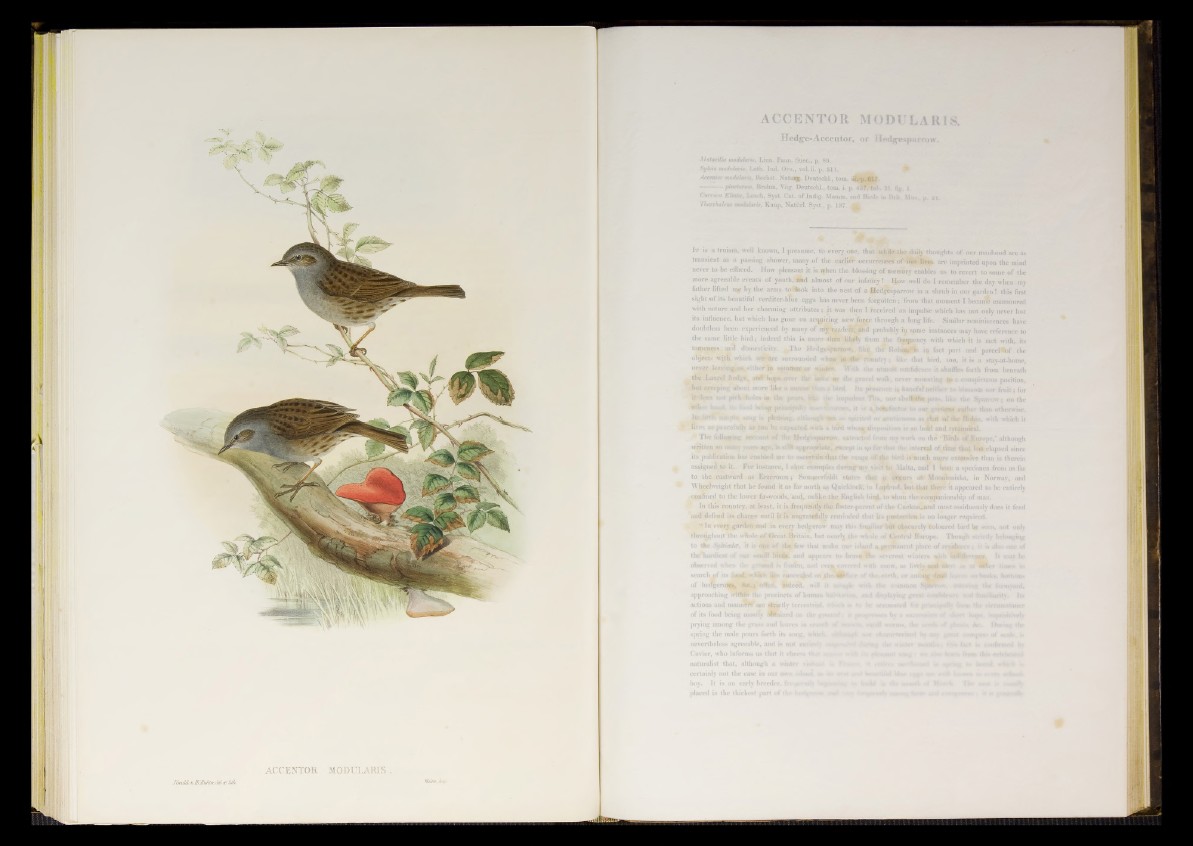
T&tndib bMOIhdcta: dds et- fflfù
ACCENTOR MODULARI S .
Uh/io: Imp
ACCENTOR MODULAR IS,
Hedge-Accentor, or IIedg*esparrow.
Motacilla modularis, Linn. Faun. Suec., p. 89.
Sylvia modularis, Lath. Ind. Orn., vol. ii. p. 511.
Accentor modular™. Bechst. Natnrg. Deutschl., tom. iifcifp. 617
— jnnelonm, Brehm, Vög. Deutschl., tom. i. p. 45^j ta?;. 21. fig. i .
Curruca Eliota, Leach, Syst. Cat. of Indig. Manim. and Birds in Brit. Mus., p. 24.
Tharrhaleus modularis, Kaup, Natiirl. Syst., p. 137. Jtik
I t is a truism, well known, I presume, to every one, that while the daily thoughts of our manhood are as
transient as a passing shower, many of the earlier occurrences of our lives are imprinted upon the mind
never to be effaced. How pleasant it is when the blessing o f memory enables us to revert to some of the
more agreeable events of youth, and almost of our infancy! How well do I remember the day when my
father lifted me by the arms to look into the nest o f a Hedgesparrow in a shrub in our garden ! this first
sight o f its beautiful verditer-blue eggs has never been forgotten; from that moment I becaml enamoured
with nature and her charming attributes ; it was then I received an impulse which has not only never lost
its influence, but which has gone on acquiring new force through a long life. Similar reminiscences have
doubtless been experienced by many of my readers, and probably in some instances may have reference to
the same little bird ; indeed this is more than likely from the frequency with which i t is met with, its
tameness and domesticity. The Hedgesparrow, like the Robi»,- is in fact part and parceldbf the
objects with which we? arc surrounded wheu in «Be country ; like that bird, too, it is a stay-at-home,
never leasing:;S.ts either hi summer or wittier. With the utmost confidence it shuffles forth from beneath
the Laurel hedge, and hops over the uw« o r the gravel walk, never mounting to u conspicuous position,
hut creeping about more like a mouse tk«» ? bird, its presence is baneful neither to blossom nor fruit ; for
Undoes not pick ¿holes iu the prates, Kit* the impudent 'Pits, nor slu-H-tHe peas, like the Sparrow ; on the
«the- fesv-xs. ir. being priucèpalL nvwH'ttyufou*, ft ss a bettefaetor to our gnrdeu» .rather than otherwise.
sisifde. -ottg is pleasing. spirited or «outntunm as : hot of the ftofùii, with which it
lives as peacefully as can he expected with * bird whose d*s|wwitu*n is so bold and tyrannical.
The fbUowbig aeetwml ttf tbc Hedgr«parrow, extracted from my work on thè ‘ Birds of Europe,’ although
written so many year* ago. is stiff appropriate, except in sp fur that live interval of time that has elapsed since
its publication has enabled me to ascertain that the range of the bird is much more extensive than is therein
assigned to it. For instance, I shot, examples during my ri*i* to Malta, and 1 liavc a specimen from as far
to the .eastward as Erzeroum; Sommerfeldt states that a occurs at- Mu onion iska, in Norway, and
Wheelwright that he found it as far north as Quickiock, in Lapfand, hut that there it appeared to be entirely
confined to the lower fir-woods, and, unlike the English bird, to shun the companionship of man.
In this couutry, a t least, it is frequently the foster-parent of the Cuckoo^nnd most assiduously does it feed
and defend its charge until it is ungratefully reminded that its protection is no longer required.
“ In every garden and in every hedgerow may this familiar but obscurely Coloured bird be seen, not only
throughout the whole o f Great Britain, but nearly the whole of Central Europe. Though strictly belonging
to the SyMatite, it is ope o f the few that make our island a permanent place of residence ; it i* tdso one of
the hardiest of our small birds, and appears to bravo the severest winters wish U f i f k r tw . It ¡¡lav
observed when tUr grt«oad is frozen, and even covered with mow, as lively and aHer1 other times in
search,of its ¡bod, x t t * t | s concealed on the afa ■ ■ »• of the eartb, or among dead - >»> hmki, bottom*
of h e d g e row dee.; often, indeed, will it mingle with riir common Sparrow éttmiiq- the farmyard,
approaching within the precincts of hnman habti*rioM, >r..i disntaving great omfidrm’c iamdiuritv. It«
actions and inauncris' are strictly terrestrial, winch w to he accounted tor ffrwcfaalh from the ewcWMtonee
of its food being mostly obtained on the around . n progresses bv u sttccc«viem of l.----- fama, inquisitively
prying among the grass and leaves in m u d i m d i worms, tin- mm
spring the male pours forth its song, which. .
nevertheless agreeable, and is not entirvèv •: • > <Wtw the winter mouth« i itw tort ia i unfit mail far
Cuvier, who informs us that it cheers that ■
naturalist that, although a winter •• bh.,: ■
certainly not the case in our own udaed, m in* and f aw td d f a r «w* me well know» to > ■. - «atomi»
boy. It is an early breeder, frvtpveaiit bw nw f a to >> ><h.; » Hu mouth >i VI .<-• i
placed in the thickest part of the .yud . ",i!, «-i*v turar mxt o r vgeeea* : sS » ■reMttdb